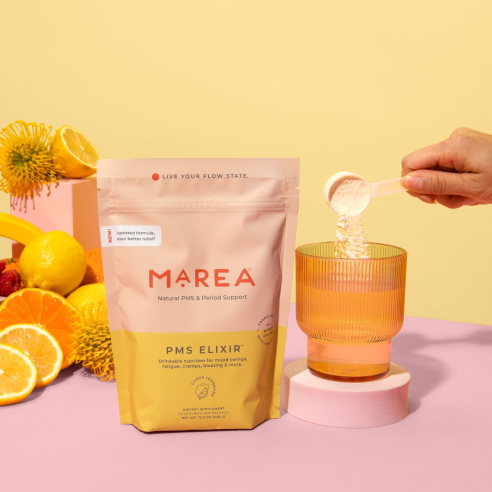Season 5 Episode 6
The Truth About Ovulation & Why It Matters (Even If You're Not Trying to Conceive)
Think ovulation only matters when you're trying to get pregnant? Think again. In this essential episode of The Flow State Podcast, hosts Monica Grohne (founder of Marea) and registered dietitian Norah Candido reveal why ovulation is your fifth vital sign and the surprising ways it impacts your bone health, mood, sleep, and overall wellbeing – regardless of your fertility goals.
Ovulation: The Main Event of Your Menstrual Cycle
While most women focus on their period as the "main event," ovulation is actually the star of your menstrual cycle. This critical process occurs when your ovary releases an egg, typically between days 14-18 of your cycle. But here's what many don't know: you can have a period without ovulating, and conversely, you can ovulate without having a period (especially postpartum).
Understanding whether you're ovulating regularly provides crucial insights into your overall health status, making it an essential marker for every woman to track.
Monica's Real-Life Ovulation Journey: When Training Goes Too Far
Monica shares her personal experience of losing healthy ovulation patterns during intense 50K race training. Her story illustrates how quickly lifestyle factors can impact reproductive health:
Warning Signs She Experienced:
- Shortened periods (one day of red blood, minimal flow)
- Poor sleep quality from elevated cortisol
- Reduced cervical mucus production
- Minimal temperature rise after ovulation
- 23-25 day cycles (shorter than her typical 27-day cycles)
After completing her race, Monica prioritized stress management, adequate nutrition, and reduced training intensity. Her recovery timeline demonstrates the 90-day follicle development cycle – it took approximately three months to see improvements, with a setback from an allergic reaction requiring additional recovery time.
How to Know If You're Ovulating: Key Signs to Track
Physical Signs of Healthy Ovulation:
- Basal body temperature rise of 0.5-1 degree after ovulation
- Elevated temperature sustained for 12-14 days (luteal phase)
- Cervical mucus changes from creamy to clear, stretchy "egg white" consistency
- LH surge detected on ovulation predictor kits
- Increased libido around ovulation
- Mittelschmerz (mid-cycle ovulation pain on alternating sides)
Signs You May NOT Be Ovulating:
- No temperature shift throughout your cycle
- Absence of fertile cervical mucus
- No LH surge on ovulation predictor kits
- Very short cycles (under 21 days consistently)
- Mood instability without the calming effect of progesterone
The Hidden Health Benefits of Regular Ovulation
Bone Health Protection
Ovulation produces progesterone, which along with estrogen, plays a crucial role in bone formation and protection. Women on hormonal birth control who don't ovulate for extended periods show increased rates of fractures and bone density issues – a connection many don't realize until it's too late.
Mood and Sleep Regulation
The progesterone produced during ovulation acts as nature's calming hormone, promoting:
- Better sleep quality
- Improved mood stability
- Reduced anxiety
- Enhanced stress resilience
Metabolic Benefits
Regular ovulation supports healthy metabolism and helps maintain the natural hormonal fluctuations that optimize energy levels throughout your cycle.
What Disrupts Ovulation (And How to Fix It)
Common Ovulation Disruptors:
- Chronic stress (physical or psychological)
- Under-eating or restrictive dieting
- Low body fat (below 18% for most women)
- Excessive exercise without adequate recovery
- Hormonal birth control (intentionally suppresses ovulation)
- Thyroid dysfunction
- Environmental toxins
Supporting Healthy Ovulation:
Nutritional Foundations:
- Adequate calorie intake to support hormone production
- Quality multivitamin with therapeutic dosages
- Anti-inflammatory nutrients like ginger and EGCG from green tea
- Antioxidants including CoQ10 and quercetin for egg quality
Lifestyle Factors:
- Stress management through personalized relaxation techniques
- Adequate body fat (minimum 18% for most women)
- Quality sleep with consistent timing
- Moderate exercise that doesn't overtax your system
The 90-Day Rule: Why Patience Is Essential
Understanding the 90-day follicle development cycle is crucial for anyone working to restore healthy ovulation. The egg released this month began developing three months ago, which means:
- Changes take time to show up in your cycle
- Lifestyle modifications need at least 3-6 cycles to create visible improvements
- Short-term stressors may impact cycles months later
- Consistent habits are more important than perfect days
Birth Control and Ovulation: What You Need to Know
Hormonal contraceptives intentionally suppress ovulation by maintaining static hormone levels throughout the month. While effective for pregnancy prevention, this means missing out on the natural hormonal fluctuations that support bone health, mood regulation, and overall wellbeing.
Many women report feeling "more like themselves" and experiencing improved mental clarity after coming off hormonal birth control and restoring natural ovulation patterns.
When to Seek Professional Support
Consider working with a qualified practitioner if you're experiencing:
- Consistently short luteal phases (less than 10 days)
- No clear ovulation signs after tracking for several months
- Significant cycle irregularities that don't improve with lifestyle changes
- Persistent mood or energy issues throughout your cycle
Supporting Your Ovulation Journey
Whether you're planning for future fertility or simply optimizing your health, supporting healthy ovulation benefits every aspect of your wellbeing. Start with foundational practices like stress management, adequate nutrition, and consistent sleep.
For those seeking structured support, consider joining programs focused on cycle optimization or working individually with practitioners who understand the nuances of female hormone health.
Key Takeaways
- Ovulation is a vital sign – it indicates overall health, not just fertility potential
- Recovery takes time – allow 3-6 months for meaningful cycle improvements
- Stress management is crucial – chronic stress directly suppresses ovulation
- Weight matters – maintaining adequate body fat supports hormone production
- Birth control impacts extend beyond pregnancy prevention
- Individual tracking helps identify your unique patterns and needs
Remember: You don't need to be trying to conceive to benefit from healthy ovulation. This natural process supports your bones, mood, sleep, and overall vitality throughout your reproductive years and beyond.











